Children: The unintended victims of divorce
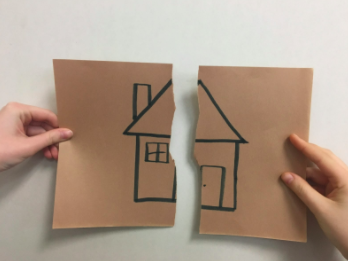
After a children’s parents go through divorce, they must learn how to adjust to the separate lives that they live.
‘Til Divorce Do Us Part
“Sorry, I can’t come. I’m at my dad’s house this weekend,”is what Madaline Miller, freshman at Homestead, typically says to her friends on a Friday night.
For Miller, whose dad lives a mere 30 minutes away, this is a usual weekend. It is also the usual for the other 1.5 million children whose parents in the United States are split as well, according to scientificamerican.com.
In fact, Psychology Today claims that over one-third of marriages in the U.S result in divorce. As people move onto second or third marriages, the stakes of dissolution are even higher. While living in a country that ranks in the top five highest of divorce rates, the separation of spouses is not abnormal. Although that rate is going down.
There are many speculations as to why the number reached a low in 2016 and has steadily remained there. Education has contributed to this decrease, researchers say. Your chance of divorce declines by 13% alone if you have studied in college, McKinley Irvin Family Law says.
As more kids stay in school, and continue onto post-secondary education, they tie the knot much later than past generations have. Therefore having more time to mature and develop deeper relationships.
Plus, those who wed after the age of 25, have a 24% less chance of splitting, and if your parents are happily married, you are 14% less likely to experience divorce in your own marriage, says mckinleyirvin.com.
Speaking of parents and kids, couples with children have 40% less chance of divorcing as well according to mckinleyirvin.com, which is shocking, considering many believe kids to be a stress inducer on relationships
However, the children whose parents do decide to end their marriage, can endure significant amounts of stress during a divorce. Many adolescents are impacted when their parents call it quits.
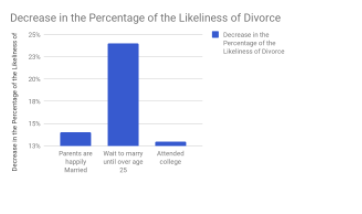
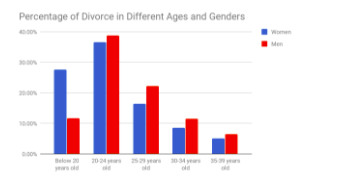
“You’re getting a what?!…”
The initial reaction of children to divorce tends to be shock or anger. Some teens experience fear or anxiety. For others, the news is not unexpected. In a study run by E. Mavis Hetherington, a psychologist at the University of Virginia who is the leading researcher in divorce, those in higher conflict homes, are less surprised by divorce and tend to be relieved. In lower conflict households, where a break up is unanticipated, kids are taken by surprise and have more questions or confusion.
Homestead social worker, Ms. Terry Carr, talked about how trust between parents and their kids has to be mutual. Parents should be able to trust their kids by answering questions and keeping them aware of the change. “It’s trusting that you can handle certain things, even though it may be hard, it may be painful, we all can cope better with the devil that we know, versus the devil that we don’t,” Carr said.
Another research project by Hetherington followed children of divorced and two-parent families for 25 years to study the long-term influences, if there were any at all. Hetherington observed that a common factor was parenting, or more so, the toll on it. When couples go their separate ways, a consistent set of rules or norms is difficult to maintain, and can affect the kids in the long run.
Carr explained how co-parenting, which is when two separated parents continue to raise their children together, is a big change, and sometimes difficult to do. “If [couples] can communicate and co-parent well, like a couple that’s still together, you don’t see as much [effect] on the kids,” Carr said.
The Repercussions
Another factor was social/emotional conflict. In Hetherington’s study it was found that 25% of the adults whose parents had divorced experienced serious social, emotional or psychological troubles compared with 10% of those whose parents remained together.
“In teen years, there’s a lot of parental needs. You’re becoming more independent, but there’s still decisions. They don’t realize how much teens still need their parents,” Carr said as she explained the need for parental guidance through the hard years of transition.
Psychologists Joan B. Kelly, an independent researcher working with Robert E. Emery, professor of psychology and director of the Center for Children, Families, and the Law at the University of Virginia, found that the emotional conflict seemed to take a toll on relationships of kids with divorced parents, as they had a more difficult time maintaining intimate relationships as teens and young adults. On the contrary, they found no other major differences, and most of the people were more independent and self-reliant.
While short-term effects can impact many kids of divorce, in the long run only 15% continue to face ongoing problems, and it is not proven that those are related solely to experiencing divorce.
Bringing it closer to home, the Wisconsin Department of Health Services recorded about 15,000 divorces in the state in 2014, translating to a 2.7 per 1,000 people rate. In Ozaukee area there were 248 divorces that year.
With the topic of divorce being less taboo, it’s still personal and affects families right in our local community and at Homestead High School. Every student has a different story or experience.
New school, new friends
When Max Hanson, a junior at Homestead, was in fourth grade, divorce hit home. “I was about ten years old, and it was sad. You’re just fearful,” Hanson said.
For Hanson, the divorce meant he had to transfer schools. “[The difficult thing] was that I had to switch schools, and I had to meet all new friends. That was the hardest adjustment,” Hanson recalls.
Although it may be rough, Hanson wants kids who are experiencing divorce to know it will all get better. “It will all turn out fine in the end,” he says, “It’s not as bad as people make it seem.” He also adds that friends and family reached out to support him, making the change a little easier.
“A lot of students whose parents get divorced in elementary school, they know no different. They are just used to it by the time they get to high school,” Carr said in a previous interview.
Double the family
Miller, whose parents have been divorced since she was three, agrees that the change is easier when you’re younger. “When I was little, I didn’t understand what ‘divorce’ meant. When I got older, and understood, I would cry about it sometimes,” Miller said.
As she grew older, Miller’s father began dating new women, and eventually met his current girlfriend, who he is still with 11 years later. Carr explained how relationships between parents and kids can change when they start seeing new love interests. “All of a sudden your parent starts dating, and there’re this new person in your life. Sometimes [they] really like that person, and sometimes not so much,” Carr said.
For Miller she was still young when her father started dating. “Apparently [when I was little] I said to her ‘you’re not my mom’, but now they have been together for almost 11 years,” she said.
When Miller was five, her half-brother was born. Nine years later, Miller now has three more half siblings on her dad’s side. “Aww, I’m also so thankful I got more siblings, I love them,” she said.
Although it doesn’t happen for everyone, in Miller’s case, her father’s new relationship turned into a healthy, stable family, which Maddy is eternally grateful for. “My parents are both fully separated, but my dad and [his girlfriend]’s relationship actually made it easier,” Miller concludes.
It’s all about perspective
In first grade, freshman, Jackson Burd, experienced divorce between his own parents. At such a young age it is sometimes difficult for children to cope due to lack of understanding. Burd had a similar situation. “I think at that age I was kind of confused, I had no idea what was going on,” Burd recalls.
The older Burd got, the more he began to understand, as things began to change. Family events were no longer a mutual gathering. When Burd did see his family, “[I] didn’t get to see them altogether in the same room or all at once.” He also talked about how he saw less of friends on his dad’s side.
Divorce is hard on everyone, considering the circumstances. While change can be challenging, if parents focus on the needs of their children it will help the transition be smoother. Although the intention of divorce is not to harm the kids, they are still affected.
Burd ends with his advice to kids going through divorce. “Don’t try to make it a bad thing,” Burd advises, “Look at it like something new.”

Hannah Kennedy is a senior at Homestead and serves as editor in chief of Highlander Publications. She is going to study journalism in college at the University...

Kate Wade is a sophomore at Homestead High School, and this is her first trimester in Advanced Publications. She is excited to continue to learn more...


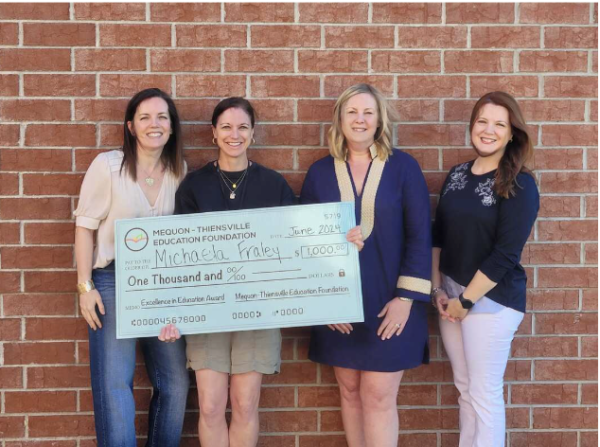
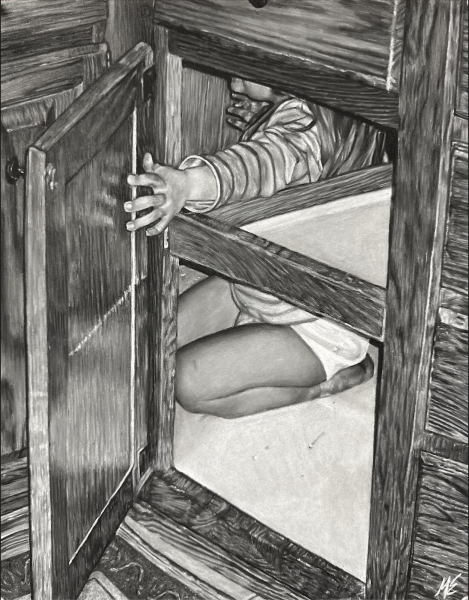


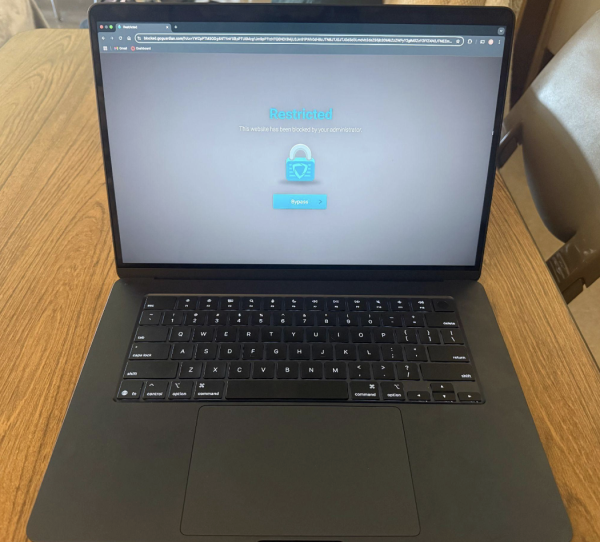

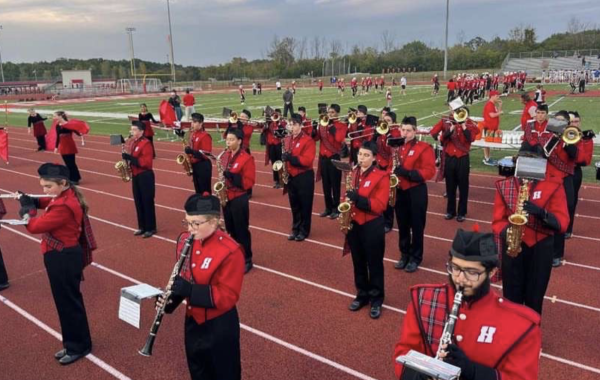
Julie Mertz • Mar 7, 2018 at 7:07 am
Informative and well-written. I appreciated reading the thoughts of teens who have experienced divorce in their family.
Nanny Stechschulte • Mar 6, 2018 at 10:58 am
It’s comforting to know that Homestead considers emotional support part of academics and our grandson values it too.